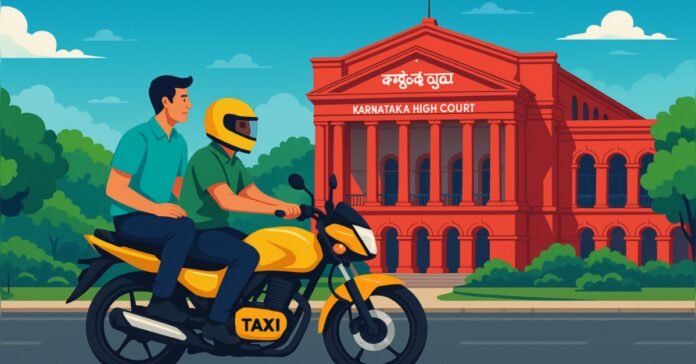[ad_1]
The petitioners challenging the state’s blanket ban on bike taxis argued in Karnataka High Court on Wednesday that the service plays a vital role in urban mobility and must be allowed to operate under existing legal provisions. “They are a necessity, not a luxury,” they said.
A Division Bench comprising Acting Chief Justice V Kameswar Rao and Justice C M Joshi was hearing appeals filed by ride-hailing platforms Ola, Uber, and Rapido, as well as bike taxi owners and associations, against an earlier ruling by a single judge that effectively outlawed bike taxi operations in the state.
The single judge’s April verdict had barred bike taxi aggregators from operating until the Karnataka government formally notifies guidelines under Section 93 of the Motor Vehicles Act, 1988.
The court had also held that the state transport department was under no obligation to register motorcycles as transport vehicles or issue them contract carriage permits. Accordingly, the order directed a complete shutdown of bike taxi services within six weeks, a deadline later extended to June 15.
During Wednesday’s proceedings, advocate Shashank Garg, representing the Bike Taxi Welfare Association, contended that bike taxis serve as an essential function in easing traffic congestion and providing last-mile connectivity.
Citing the state’s 2021 E-Bike Taxi Policy, Garg argued that Karnataka had already laid the groundwork for such services, and its reversal in 2024 seemed politically motivated.
He also pointed out the inconsistency with a 2019 expert committee report that had recommended against allowing bike taxis in Bengaluru. That report, Garg said, was invalidated by the subsequent E-Bike Rules, which were abruptly withdrawn.
Responding to judicial queries, Garg said the state had the authority to regulate fares, adding that the current rate was around Rs 8 per kilometre. “Bike taxis are often the only mode of transport that can navigate congested areas or reach places inaccessible to cars and even ambulances.”
Senior advocate Dayan Chinnappa, representing individual bike owners Varikruti Mahendra Reddy and Madhu Kiran, questioned the legality of the state’s decision to phase out contract carriage permits for two-wheelers.
Citing Article 19(1)(g) of the Constitution, which guarantees the right to practice any profession or carry on any occupation, he said, “If the rules permit bike taxis, the state cannot refuse permits arbitrarily. That would be a direct violation of fundamental rights.”
Chinnappa emphasised that aggregator rules themselves permit the operation of bike taxis, and the state is legally obligated to register these vehicles and issue necessary permits. “The state cannot stop individuals from registering on aggregator platforms and earning their livelihood,” he said.
He further added, “It’s unfair to blame traffic woes on bike taxis when the city’s population is expanding due to its economic growth. More people means more vehicles — that’s not the fault of bike taxis.”
The court has scheduled the next hearing in the matter for July 2.
[ad_2]
Source link


